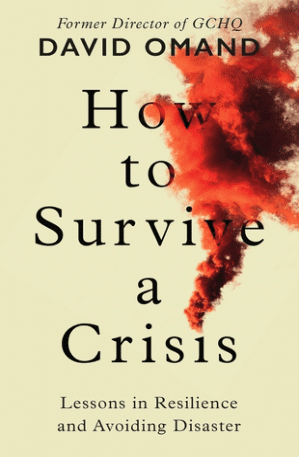The former director of GCHQ, Sir David Omand, has a new book, published by Penguin: titled, How to Survive a Crisis: Lessons in Resilience and Avoiding Disaster.
Speaking on Radio 4’s PM programme yesterday afternoon, Sir David described a crisis as that period when events hit you, with speed and an intensity faster than you can cope. “For that period of crisis, it’s out of your control, and that’s very frightening.’ He gave the metaphor of ‘rubber levers’; that in a crisis whether in government or in a business, managers may try to pull levers, yet nothing happens; ‘and that’s really scary’.
“But if you have done your preparation, if you have rehearsed some of these scenarios, if you have invested in resilience, it just becomes another of those emergencies you know how to cope with, that you will get over; but if you haven’t done that preparation and investment, you are going to slide into disaster.”
Asked by BBC presenter Evan Davis about the Cabinet Office briefing room ‘Cobra’ , Sir David recalled working on helping to set it up; ‘it was all very secret, you wouldn’t have announced a meeting was taking place because most was about terrorism, and the last thing you wanted was to give terrorists an idea of where it is. Over the years ministers have begun to realise it’s quite reassuring to the public to have a sense that the government has got a grip of this; now we have got to the stage where when anything happens you have grim-faced ministers being photographed as they go in and you have the reassuring mesage, the prime minister is chairing a Cobr this afternoon to consider the situation. There’s no harm in that but it can be overdrawn.”
Asked about artificial intelligence, Sir David said that his worry was not about the long-term; we are a long way from ‘general intelligence’; but in the wrong hands it could cause problems, he said. But the upside is enormous; such as in the prospect of new discoveries of medical drugs; and the potential economic upside for the UK.
After a crisis, Davis said, comes an (official) inquiry. What did Sir David make of the use of WhatsApp in UK government, given the release (by the Daily Telegraph) of WhatsApp messaging between covid pandemic response health minister Matt Hancock and senior civil servants. “It appalls me,” Sir David replied, also worried that important decisions were taken over informal exchanges.
King’s College London is the venue for a launch of Sir David’s book on Wednesday evening, June 28.
How to Survive a Crisis: Lessons in Resilience and Avoiding Disaster by Sir David Omand is published by Penguin Books, first as a hardback.










